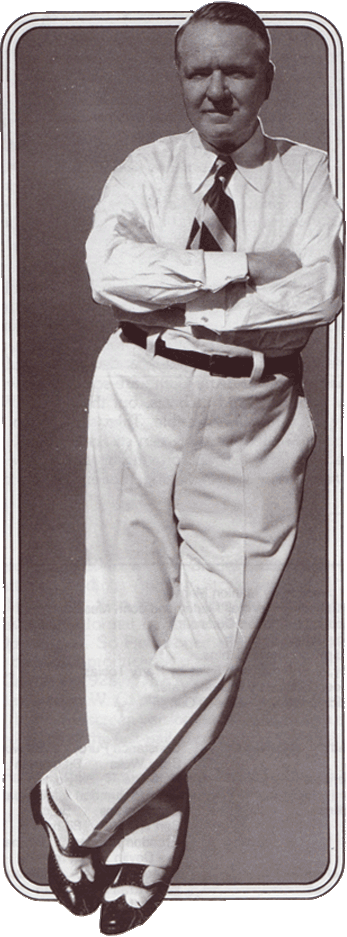By Ronald J. Fields Epilogue. W.C. Fields: A Life on Film
I stay up late at night to watch my grandfather's movies, and I still laugh uproariously. But now I see so much more beyond just the laughs. I see an artist at work, and in nearly every one of his films I see the self-portrait of an artist.
There was little difference between Souse, Bissonette, Bisbee, McGargle, McGonigle, Whipsnade and the rest of them, and W.C. Fields. What made this comic mirror of himself more than a banal self-indulgence, however, was the honesty and clarity of his vision. He dug deeply into himself and brought to life something we all recognized, and that made it art. In using his life, his likes, his hates, and his dreams as the blood and guts of his art, he drew a portrait we all understood—a portrait of twentieth-century man, of alienation and redemption. I doubt if Fields actually intended to depict the historical angst of modern man, but he did.

In these modern times man feels bewildered, pressured to conform and a lack of control over his own destiny. The individual has gotten lost in the vastness of society.
Fields was lost too, alienated from his family and society, and when he displayed this personal alienation on screen he addressed most of us. W.C. said it did not make a damn bit of difference whether or not we controlled our destinies. The only thing important to him artistically was the dignity and integrity of the individual.
That, I believe, is the core of Fields' popularity. Certainly we laugh at his marvelous humor, his lines and his antics, but we also applaud and smile and feel proud that his characters survive with dignity no matter the insults surrounding them. We rally behind these characterizations today, and most likely so will the generations to come, because they represent the glory of the individual.
Our only redemption, says Fields, is knowing oneself, and being that. So, whether Souse, Bissonette or Bisbee ends up with serendipitous wealth, or it is McGargle, McGonigle or Whipsnade flim-flamming a meager existence, the character never changes. In no purely Fields film do we feel sorry for his character, never mind the chaos swirling around him, because human dignity and self survive, the individual remains unstained. That is the greatest glory. That is what makes us smile, makes us feel good. So even when he looked his worst, “worn and torn,” he nonetheless was “as noble as Stone Mountain.”
At the end of his career, when Hollywood would not trust him with any worthwhile film work, Fields probably was not too hurt. He probably knew he would have the last word. He probably knew that no matter what the studio tried to do to take away his dignity—whether it was assigning him insulting roles in terrible films or, many years after his death, trying to sully his shade with an insulting movie about his life—his art would survive. W.C. Fields won.
And so his career came to a close among the echoes of a nascent time when William Claude Dukenfield tossed balls on a beer-hall stage in Atlantic City. At the end he played bit parts in three insignificant motion pictures, which were really nothing more than “...vaudeville put on the screen.” It was a cruel epitaph for such a great artist. Frustrated and very sick, W.C. Fields left the movie business for good.
Not long after that, W.C. lay in a hospital bed, his condition serious. It was the Christmas season 1946, and Gene Fowler, the writer, John Decker, the painter, and Dave Chasen, the restaurateur, paid a visit to their ailing friend. The trio walked quietly down the hall, each hiding a bottle of Christmas cheer under his coat. When they entered Fields' room they found him reading ... the Bible! One of them asked, “Uncle Claude, why are you reading the Bible?”
It is written that he looked up from the book and with all the self-confidence of a tenured lawyer rasped, “Just looking for loopholes.”
He probably was.
A few weeks later he fell into a coma. Then on Christmas day he awoke. He looked at the only two people holding vigil, his secretary, Magda Michael, and a nurse. He brought his forefinger to his lips to signify quiet, winked, then closed his eyes, and “the man in the bright nightgown” took him away.
I always wondered what that wink meant. Perhaps he knew he had cheated the grandest cheater of them all, mortality. Through his art W.C. Fields lives today. He was an honest man, and “you can't cheat an honest man.”

